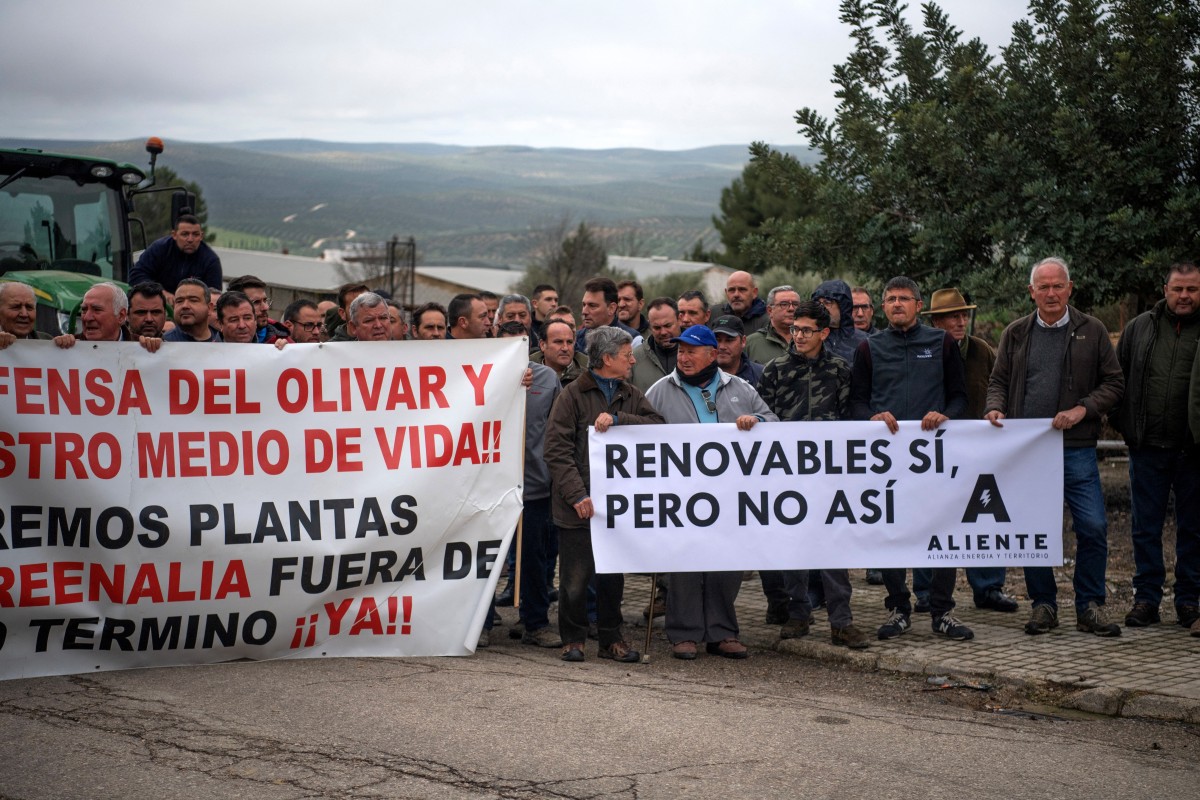Within the Andalusian village of Lopera, olive bushes house owners battle in opposition to expropriation and to stop the set up of photovoltaic vegetation forcing hundreds of bushes to be uprooted.
At his farm in southern Spain, Francisco Campos appeared worriedly at a inexperienced sea of centuries-old olive bushes that he fears will face the axe to make approach for a proposed photo voltaic park.
“Slicing down olive bushes to put in photo voltaic panels is against the law,” the 64-year-old farmer informed AFP in Lopera, a city of whitewashed buildings with 3,600 residents within the sunny southern area of Andalusia, Spain’s olive-growing heartland.
Spain is the world’s prime producer of olive oil, however the fertile agricultural land lengthy utilized by olive producers is now in excessive demand from energy companies seeking to set up photo voltaic farms.
Commercial
And with almost 3,000 hours of sunshine per yr, Andalusia is among the Spanish areas with the best variety of photo voltaic panels as a renewables growth makes the nation a European chief in inexperienced power.
Renewable power companies equivalent to Greenalia and FRV Arroyadas have requested permission to construct a number of photo voltaic farms close to Lopera, which farmers say will have an effect on as much as 1,000 hectares (2,500 acres) of property.
The companies negotiated agreements to lease the majority of the land required for his or her initiatives however encountered important opposition from a whole bunch of small landowners.
This prompted the regional authorities of Andalusia to announce it would expropriate some land wanted for the vegetation, declaring them to be in “the general public curiosity”.
“Is it within the public curiosity for them to take my land and provides it to an organization in order that the corporate can revenue? This has no profit for us,” stated Campos.
“Our lifestyle goes to be destroyed,” he added.
‘From our ancestors’
Campaigners predict that the eight photo voltaic initiatives deliberate for the realm would require the elimination of almost 100,000 olive bushes.
The regional authorities places the determine considerably decrease, at 13,000.
Native residents anticipated energy firms would search to put in photo voltaic panels within the space, however they by no means imagined “they might come and take away your property,” stated Rafael Alcala, a spokesman for a platform that represents the photo voltaic vegetation’ opponents.
In assist of landowners impacted by the newest spherical of expropriations, dozens of farmers on tractors — some holding indicators that learn “We do not need photo voltaic vegetation” — gathered on a latest morning outdoors Lopera.
“These lands come from our ancestors. What am I going to depart to my kids now?” María Josefa Palomo, a 67-year-old pensioner, stated on the protest.

Olive bushes house owners exhibit to avoid wasting their olive bushes and in opposition to expropriation amid a undertaking to put in photovoltaic vegetation in Lopera, close to Jaen, on March, 24, 2025. (Picture by CRISTINA QUICLER / AFP)
Olive bushes house owners exhibit to avoid wasting their olive bushes and in opposition to expropriation amid a undertaking to put in photovoltaic vegetation in Lopera, close to Jaen, on March, 24, 2025. (Picture by CRISTINA QUICLER / AFP)
Dropping 500 hectares of olive groves would wipe out greater than two million euros ($2.3 million) in annual revenues, in keeping with native olive oil cooperative La Loperana.
Campaigners say 5,000 olive bushes have already been uprooted from land belonging to a farmer in Lopera who signed an settlement with one of many companies behind a photo voltaic park. Extra may observe.
In an effort to cease the initiatives, opponents have filed lawsuits in opposition to the regional authorities and the businesses concerned.
Commercial
‘Till the tip’
Spain generated a document 56.8 p.c of its electrical energy final yr from renewable sources equivalent to wind and photo voltaic, in keeping with grid operator Pink Electrica.
Leveraging on its sunny plains, windy hillsides and fast-flowing rivers, Spain intends to boost the share of renewable-generated electrical energy to 81 p.c of the overall by 2030 as a part of efforts to cut back its greenhouse gasoline emissions.
The regional authorities has defended the renewables initiatives, saying lower than one p.c of the land they use within the area needed to be expropriated from reluctant landowners.
Spanish photo voltaic trade group UNEF, which represents greater than 800 firms, says the initiatives enhance tax revenues in rural communities.
They generate “important quantities” that can be utilized to enhance public companies, stated UNEF head Jose Donoso.
Photo voltaic park opponents in Lopera disagree and vow to proceed their struggle.
“Till the tip. No person goes to take what’s ours away from us,” stated Juan Cantera, a 28-year-old farmer.
“Olive oil is every little thing in Lopera”.